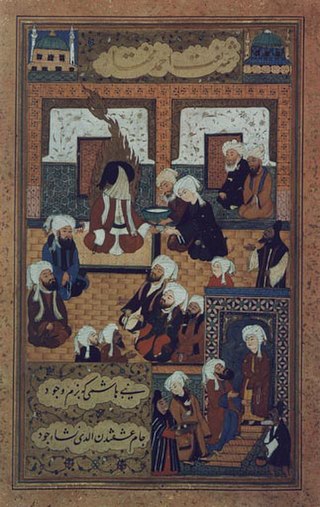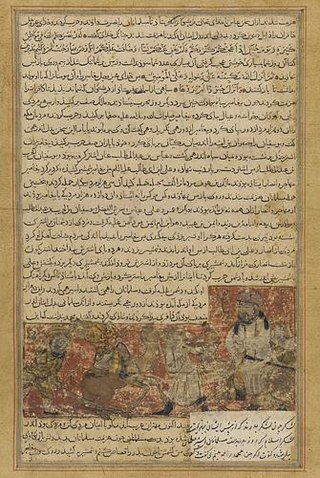Fiqh is Islamic jurisprudence. Fiqh is often described as the human understanding and practices of the sharia, that is human understanding of the divine Islamic law as revealed in the Quran and the sunnah. Fiqh expands and develops Shariah through interpretation (ijtihad) of the Quran and Sunnah by Islamic jurists (ulama) and is implemented by the rulings (fatwa) of jurists on questions presented to them. Thus, whereas sharia is considered immutable and infallible by Muslims, fiqh is considered fallible and changeable. Fiqh deals with the observance of rituals, morals and social legislation in Islam as well as economic and political system. In the modern era, there are four prominent schools (madh'hab) of fiqh within Sunni practice, plus two within Shi'a practice. A person trained in fiqh is known as a faqīh.
The Maliki school is one of the four major schools of Islamic jurisprudence within Sunni Islam. It was founded by Malik ibn Anas in the 8th century. The Maliki school of jurisprudence relies on the Quran and hadiths as primary sources. Unlike other Islamic fiqhs, Maliki fiqh also considers the consensus of the people of Medina to be a valid source of Islamic law.
Malik ibn Anas, whose full name is Mālik bin Anas bin Mālik bin Abī ʿĀmir bin ʿAmr bin Al-Ḥārith bin Ghaymān bin Khuthayn bin ʿAmr bin Al-Ḥārith al-Aṣbaḥī al-Ḥumyarī al-Madanī, reverently known as al-Imām Mālik by Sunni Muslims, was a Muslim jurist, theologian, and hadith traditionist. Born in the city of Medina, Malik rose to become the premier scholar of prophetic traditions in his day, which he sought to apply to "the whole legal life" in order to create a systematic method of Muslim jurisprudence which would only further expand with the passage of time. Referred to as the "Imam of Medina" by his contemporaries, Malik's views in matters of jurisprudence were highly cherished both in his own life and afterwards, and he became the founder of one of the four schools of Sunni law, the Maliki, which became the normative rite for the Sunni practice of much of North Africa, Al-Andalus, a vast portion of Egypt, and some parts of Syria, Yemen, Sudan, Iraq, and Khorasan, and the prominent Sufi orders, including the Shadiliyya and the Tijaniyyah.
Nuʿmān ibn Thābit ibn Zūṭā ibn Marzubān, commonly known by his kunyaAbū Ḥanīfa, or reverently as Imam Abū Ḥanīfa by Sunni Muslims, was a Sunni Muslim theologian and jurist who became the eponymous founder of the Hanafi school of Sunni jurisprudence, which has remained the most widely practised school of law in the Sunni tradition. The school of thought predominates in Central Asia, Afghanistan, Iran, Turkey, the Balkans, Russia, Circassia, Pakistan, Bangladesh, Muslims in India, and some parts of the Arab world. He is also widely called al-Imām al-Aʿẓam and Sirāj al-Aʾimma by Sunni Muslims.
Saahibul Hadith Imam Ul Adham Ahmad ibn Hanbal al-Dhuhli, was a Muslim jurist, theologian, ascetic, hadith traditionist, and founder of the Hanbali school of Sunni jurisprudence — one of the four major orthodox legal schools of Sunni Islam. The most highly influential and active scholar during his lifetime, Ibn Hanbal went on to become "one of the most venerated" intellectual figures in Islamic history, who has had a "profound influence affecting almost every area of" the traditionalist perspective within Sunni Islam. One of the foremost classical proponents of relying on scriptural sources as the basis for Sunni Islamic law and way of life, Ibn Hanbal compiled one of the most important Sunni hadith collections, the Musnad, which has continued to exercise considerable influence in the field of hadith studies up to the present time.

The Companions of the Prophet were the disciples and followers of Muhammad who saw or met him during his lifetime, while being a Muslim and were physically in his presence. "Al-ṣaḥāba" is definite plural; the indefinite singular is masculine صَحَابِيٌّ, feminine صَحَابِيَّةٌ.
This is a timeline of major events in the Muslim world from 601 AD to 700 AD.

The Muwaṭṭaʾ or Muwatta Imam Malik of Imam Malik (711–795) written in the 8th-century, is one of the earliest collections of hadith texts comprising the subjects of Islamic law, compiled by the Imam, Malik ibn Anas. Malik's best-known work, Al-Muwatta was the first legal work to incorporate and combine hadith and fiqh.
Al-Nasāʾī, full name Abū ʿAbd al-Raḥmān Aḥmad ibn Shuʿayb ibn ʿAlī ibn Sinān al-Nasāʾī,, was a noted collector of hadith, from the city of Nasa, and the author of "As-Sunan", one of the six canonical hadith collections recognized by Sunni Muslims. From his "As-Sunan al-Kubra " he wrote an abridged version, "Al-Mujtaba" or Sunan al-Sughra. Of the fifteen books he is known to have written, six treat the science of hadīth.
Muḥammad ibn Abī Bakr, was the youngest son of the first Islamic caliph Abu Bakr. His mother was Asma bint Umais, who was a widow of Ja'far ibn Abi Talib prior to her second marriage with Abu Bakr. He became the stepson of the fourth caliph Ali, and became one of his generals. He was one of the main figures in rebellion against Uthman and was actively involved in siege of his house which resulted in caliph's death. Gayyab narrates in his book Fitnat Maqtal ‘Uthman, 1/209 that "it is clear that Muhammad ibn Abi Bakr was innocent in the murder of Usman, just as the wolf was innocent of the blood of Yusuf ‘alayh al Salam."

Abd Ar-Rahman ibn Sakhr, also known as Abu Hurairah was one of the companions of Islamic prophet Muhammad and, according to Sunni Islam, the most prolific narrator of hadith. He served as the Rashidun military governor of Bahrain during the reign of Caliph Umar.

Banū Taym was a clan of the Quraysh tribe of Mecca. The first caliph, Abu Bakr, hailed from the Banu Taym, as did another prominent companion of Muhammad, Talha ibn Ubaydallah.

Al-Qāsim ibn Muḥammad ibn Abī Bakr was a jurist in early Islam.

The Battle of Hunayn was a conflict between the Muslims of the Islamic prophet Muhammad and the tribe of Qays in the aftermath of the conquest of Mecca. The battle took place in 8 AH in the Hunayn valley on the route from Mecca to Taif. The battle ultimately ended in a decisive victory for the Muslims, and it is one of the few battles mentioned by name in the Qur'an, where it appears in Surat at-Tawbah.
Dhia' ul-Dīn 'Abd al-Malik ibn Yūsuf al-Juwaynī al-Shafi'ī was a Persian Sunni scholar famous for being the foremost leading jurisconsult, legal theoretician and Islamic theologian of his time. His name is commonly abbreviated as al-Juwayni; he is also commonly referred to as Imam al-Haramayn meaning "leading master of the two holy cities", that is, Mecca and Medina. He acquired the status of a mujtahid in the field of fiqh and usul al-fiqh. Highly celebrated as one of the most important and influential thinkers in the Shafi'i school of orthodox Sunni jurisprudence, he was considered as the virtual second founder of the Shafi'i school, after its first founder Imam al-Shafi'i. He was also considered a major figurehead within the Ash'ari school of theology where he was ranked equal to the founder, Imam al-Ash'ari. He was given the honorific titles of Shaykh of Islam, The Glory of Islam, The Absolute Imam of all Imams.
Abū Bakr Muḥammad ibn aṭ-Ṭayyib al-Bāqillānī, often known as al-Bāqillānī, was an Sunni Arab polymath who specialized in theology, jurisprudence, logic and hadith who spent much of his life defending and strengthening the Ash'ari school of theology within Islam. An accomplished rhetorical stylist and orator, al-Baqillani was held in high regard by his contemporaries for his expertise in debating theological and jurisprudential issues. Al-Dhahabi called him "The Learned Imam, Incomparable Master, Foremost of the Scholars, Author of many books, The Example of Articulateness and Intelligence."
Yūsuf ibn ʿAbd Allāh ibn Muḥammad ibn ʿAbd al-Barr, Abū ʿUmar al-Namarī al-Andalusī al-Qurṭubī al-Mālikī, commonly known as Ibn ʿAbd al-Barr was an eleventh-century Maliki scholar and Athari theologian who served as the Qadi of Lisbon. He died in December 2, 1071 (aged 93).

Asmāʾ bint Abī Bakr was one of the companions of the Islamic prophet Muhammad and half-sister of his third wife Aisha. She is regarded as one of the most prominent Islamic figures, as she helped Muhammad during the Hijrah from Mecca to Medina.

Abd al-Rahman ibn al-Qasim al-Utaqi (Arabic: عبدالرحمن ابن القاسم, romanized: ʿAbd al-Rahmān ibn al-Qāsim; c. 750–806 was a prominent early jurist in the Maliki school from Egypt. He was one of Malik's main companions and had a tremendous influence in recording the positions of the school. Ibn al-Qasim was the source for Sahnun in his Mudawwana, a record of Malik's teachings. He has the same position in the Maliki school as Muhammad al-Shaybani has in the Hanafi school, in so far as both of them transmitted their respective schools and made free use of ijtihad. Ibn al-Qasim had opinions which differed from those of Malik, to the point that it was said that he was dominated by opinion.







